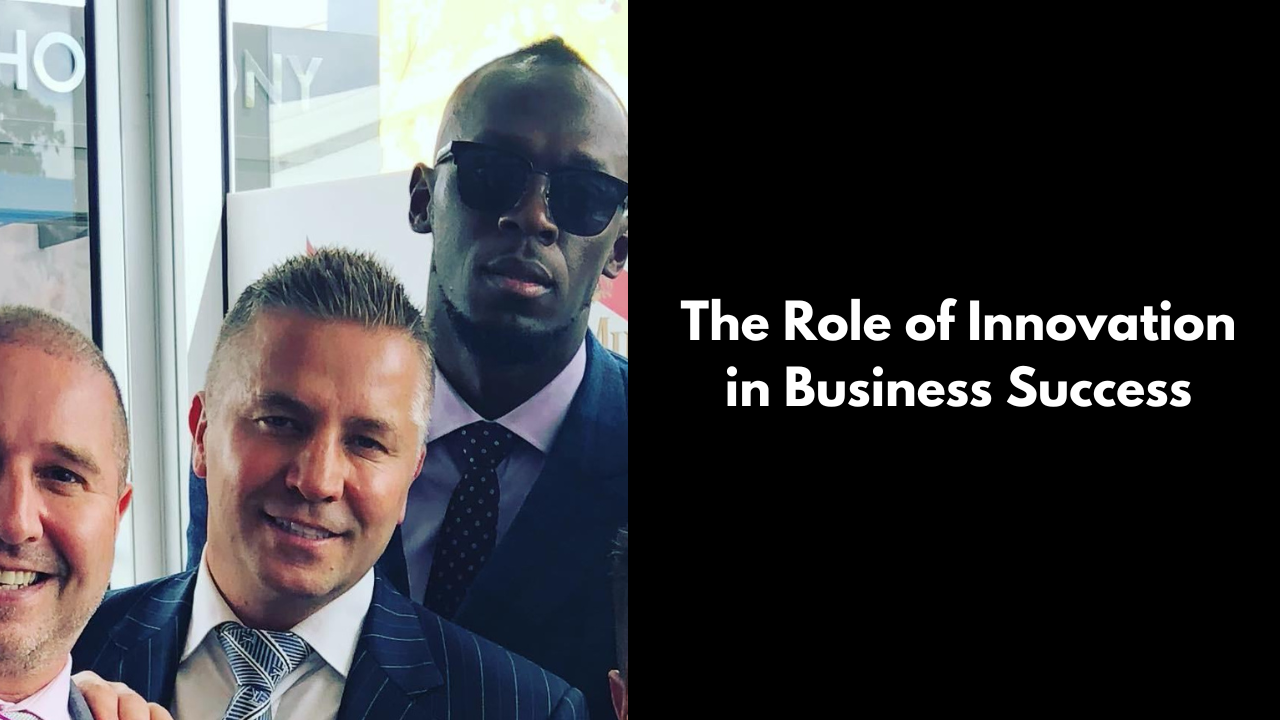Innovation is a critical driver of business success in today’s rapidly changing market. Companies that embrace innovation can differentiate themselves, meet evolving customer needs, and maintain a competitive edge. David Deicke, an Australian multimillionaire and successful entrepreneur, has consistently leveraged innovation to grow his business in the luxury car industry. This blog explores the role of innovation in business success, drawing on insights from David Deicke’s experiences.
Understanding Innovation

1. Defining Innovation: Innovation involves creating new ideas, products, services, or processes that add value to the business and its customers. It’s about thinking outside the box and finding creative solutions to problems. David Deicke’s approach to innovation has always been about improving customer experience and operational efficiency.
2. Types of Innovation: There are various types of innovation, including product innovation, process innovation, and business model innovation. Product innovation involves developing new or improved products, while process innovation focuses on enhancing operational processes. Business model innovation involves changing the way a company creates, delivers, and captures value. David has implemented all three types in his business, from introducing advanced car repair techniques to optimizing his service delivery process.
3. The Importance of Innovation: Innovation is crucial for staying relevant in a competitive market. It drives growth, improves efficiency, and enhances customer satisfaction. Businesses that fail to innovate risk becoming obsolete. David’s commitment to innovation has kept his business at the forefront of the luxury car industry.
Driving Innovation in Your Business
1. Cultivating a Culture of Innovation: Creating a culture that encourages and supports innovation is essential. This involves fostering an environment where employees feel empowered to share ideas and experiment with new approaches. David emphasizes the importance of an open-minded culture where creativity is valued.
2. Investing in Research and Development: Investing in research and development (R&D) is key to driving innovation. This can involve dedicating resources to exploring new technologies, materials, and methods. David’s business invests significantly in R&D to stay ahead of industry trends and continuously improve their services.
3. Encouraging Collaboration: Collaboration is a powerful driver of innovation. Encourage cross-functional teams to work together and share their diverse perspectives and expertise. David’s business practices collaborative problem-solving, bringing together mechanics, designers, and customer service professionals to brainstorm innovative solutions.
4. Staying Customer-Centric: Innovation should always be customer-centric. Understanding and anticipating customer needs and preferences is crucial for developing products and services that truly add value. David regularly seeks feedback from his customers and uses it to guide his innovation efforts.
5. Leveraging Technology: Technology is a major enabler of innovation. Stay abreast of the latest technological advancements and explore how they can be integrated into your business. David’s use of advanced diagnostic tools and automation technologies has significantly enhanced his business operations.
Overcoming Challenges in Innovation

1. Managing Risk: Innovation involves taking risks, which can be daunting for many businesses. Effective risk management strategies, such as conducting pilot tests and contingency planning, can help mitigate potential downsides. David’s approach involves carefully evaluating risks and being prepared to pivot if needed.
2. Overcoming Resistance to Change: Resistance to change is a common barrier to innovation. Overcoming this resistance requires clear communication, demonstrating the benefits of innovation, and involving employees in the change process. David engages his team in decision-making and ensures they understand the positive impact of innovation on their work and the business.
3. Ensuring Resource Availability: Innovation requires resources, including time, money, and talent. Ensuring that these resources are available and effectively allocated is critical. David prioritizes resource allocation for innovation projects and continuously seeks ways to optimize resource use.
4. Maintaining a Long-Term Perspective: Innovation often involves a long-term perspective and patience. Immediate results may not always be visible, but consistent efforts can lead to significant breakthroughs over time. David advises entrepreneurs to stay committed to their innovation goals and remain patient.
Case Studies of Innovation in David Deicke’s Business
1. Advanced Repair Techniques: David’s business introduced advanced repair techniques using state-of-the-art equipment and materials. This not only improved the quality of repairs but also reduced the turnaround time, enhancing customer satisfaction. These innovations positioned his business as a leader in the luxury car repair market.
2. Digital Transformation: Embracing digital transformation, David implemented an integrated digital system for managing customer relationships, service bookings, and inventory. This streamlined operations, improved data accuracy, and provided customers with a seamless experience. The digital system also enabled better tracking of customer preferences and service history.
3. Sustainable Practices: David’s commitment to sustainability led to the adoption of eco-friendly practices, such as using water-based paints and recycling materials. These practices not only reduced the environmental impact but also appealed to environmentally conscious customers. Sustainability has become a key differentiator for his business.
4. Customization Services: Recognizing the demand for personalized experiences, David introduced customization services for luxury cars. Customers could now personalize their vehicles with unique features and designs, creating a distinctive identity for their cars. This service added a new revenue stream and increased customer loyalty.
The Future of Innovation

1. Embracing Emerging Technologies: The future of innovation lies in emerging technologies such as artificial intelligence, blockchain, and the Internet of Things (IoT). Businesses that explore and integrate these technologies can gain a competitive advantage. David is currently exploring the use of AI for predictive maintenance and blockchain for transparent supply chain management.
2. Fostering Continuous Learning: Continuous learning and staying updated with industry trends are essential for sustaining innovation. Encourage a learning culture within your organization and provide opportunities for professional development. David invests in regular training and development programs for his team to keep them abreast of the latest advancements.
3. Collaborating with Startups: Collaborating with startups and innovative companies can bring fresh ideas and technologies into your business. These partnerships can drive co-innovation and accelerate the adoption of new solutions. David collaborates with tech startups to integrate cutting-edge technologies into his operations.
4. Focusing on Customer Experience: The future of innovation will increasingly focus on enhancing customer experience. Personalization, convenience, and seamless interactions will be key drivers of customer satisfaction. David’s business is working on creating a more personalized and immersive customer experience through virtual reality showrooms and AI-driven customer service.
Conclusion
Innovation is the cornerstone of business success in the modern world. It drives growth, improves efficiency, and enhances customer satisfaction. David Deicke’s journey highlights the transformative power of innovation and provides valuable lessons for aspiring entrepreneurs.
By cultivating a culture of innovation, investing in research and development, encouraging collaboration, staying customer-centric, and leveraging technology, businesses can unlock new opportunities and achieve sustained success. Overcoming challenges in innovation requires effective risk management, overcoming resistance to change, ensuring resource availability, and maintaining a long-term perspective.
As the business landscape continues to evolve, embracing emerging technologies, fostering continuous learning, collaborating with startups, and focusing on customer experience will be crucial for future innovation. Let David Deicke’s insights inspire you to harness the power of innovation and drive your business towards a prosperous future.

